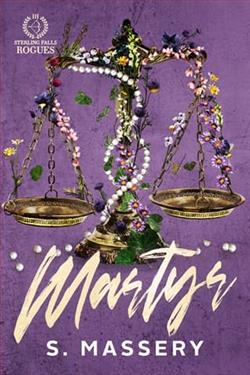Page 5 of Falling for You
‘Was it India? Are you thinking of travelling?’
‘Rodneyis,’ she says pointedly. ‘He’s got this mad idea about us taking a year off and travelling around the world together. He thinks we both work too hard.’
‘You do work too hard.’ I raise my eyebrows at her but she clicks her tongue at me, laughing.
‘Do you want a coffee?’ I call over my shoulder as I walk into the kitchen.
There are six of us who work here now, but for the first hour of the morning it’s usually just me and Pam, and to be honest, that’s when I like it best. I mean, sure, she doesn’t want to engage in any small talk whatsoever and some days she doesn’t even look at me from over her computer, but I quite like it. It’s always the same, and there is something quite calming about that.
‘Go on, then,’ Pam says. ‘But a normal one, none of your pumpkin shit.’
I laugh, rolling my eyes as I pull our two mugs down from the cupboard.
Like I’d waste my pumpkin spice syrup on Pam. She doesn’t even know who Morticia Addams is.
CHAPTER TWO
Nate
London seduced me. There, I said it. And like any great seduction, it did it so slowly that I didn’t even notice until I was slap bang in love with it.
It’s my brother, Stevie’s, fault. He moved here from our childhood home in New York when he was nineteen, right when I’d finished college. I was supposed to be the exciting, adventurous one. But there I was, moving back in with our parents while he hopped across the pond to attend the Royal Ballet School. At first Stevie stayed with our Aunt Tell, but now he’s in Camden in a small, two-bed flat above a record shop. I never really understood why he moved out, but he always brushes it off when I ask him. We got pictures of all the landmarks at first, the novelty of the first subway (or ‘tube’ as he called it), the first pillar-box-red bus, the first selfie with the guards standing to attention at Buckingham Palace – but then it evolved as Stevie did. As he sank comfortably into London life, we started getting pictures of nights out in Soho, his ‘dinner’ in Chinatown at 3 a.m., the sparkling River Thames as he walked to dance rehearsals every morning. It always looked so exciting and, well, inviting.
Then there was the second layer of seduction: all the British TV shows.Made in Chelsea, where it’s always bright blue skies and crisp sunlight,Sherlockwith the clipped, precise accents andLine of Dutywith the camaraderie of an English country pub. Mom and I even got into the British Christmas films, and spent each year watchingThe Holiday,Love ActuallyandNativity. Everything about it was so picturesque, so rosy-cheeked, and just so … perfect.
But the thing is, although I had this secret love affair with London, I never actually wanted to go. It felt like the exciting, eclectic cousin of New York. Over the years, friends of mine would flit off, hopping over the pond under the guise of a ‘gap year’, but then they’d fall in love with the city, or another person, and never come back. If I’m honest, I couldn’t fully trust in myself that I wouldn’t do the same thing. I mean, Stevie had as good as moved over permanently, and if I did then Mom would be left in New York without either of us. I couldn’t do that to her.
But then things changed. Mom started to get a bit … Well, worse. Everything got a bit worse, actually. Dad lost the sparkle behind his eyes. I felt if one more person added even the smallest feather to my cart, I’d kick it all over like a flailing buckaroo and pelt off into the distance, never to be seen again. Stevie didn’t understand, really. I’d tried speaking to Dad, but he shrugged it off, saying he was fine. Though he never tried to claim Mom was fine. I didn’t know how I could help her, and there was no point speaking to Mom about it. You don’t want to tell a sick person how scared you are of them being sick. So I just sat back, doing whatever I could butultimately feeling pretty helpless. Until one day she dropped a name into conversation like a little piece of gold dust, and I realised how I could help.
Her sister. My Aunt Thelma. Or Tell, as Mom calls her.
I hadn’t heard Mom mention my Aunt Tell for years. They spoke on the phone at Christmas and on birthdays, and we’d occasionally get some form of ridiculous newsletter through the post, stuffed full of updates about her fabulous single life in London and what she’d been up to. But that was it, and I thought Mom was fine with it. Until a few weeks ago, when she was having a particularly bad couple of days, and said five words that flicked a switch inside me:
I wish Tell was here.
And there it was. My catalyst, propelling me into London. I tried to call Aunt Tell, I messaged her, I even wrote her a letter since she seemed to enjoy the post so much. I told her about Mom, how she’d been asking for her, how she wasn’t well, how great it would be if she came back to New York to visit. But she didn’t answer.
Some people might take this as a sign to shelve Aunt Tell, to tell Mom that she wasn’t around and then just move on with life. I, however, saw this as a challenge. Go to London, find Aunt Tell, bring her back to New York. Make Mom happy, make everything that little bit better.
And the thing is, once Mom mentioned Aunt Tell, she didn’t stop. She started regaling me with stories about their childhood together, the fights they had as teenagers and the trouble they got up to behind my grandmother’s back. She described Aunt Tell’s appearances on the stage and howproud she was, how talented Tell had always been and how she always performed for her in their shared bedroom. Every time she spoke of her it made the need to bring Aunt Tell back to New York burn a little stronger in my chest. If Mom looked this happy when speaking about her, if sherememberedso much about her and their lives together, then imagine what could happen if she saw her in person and they spent some time together. Or even just spoke on the phone? Or received a letter from her? At this point, I would have settled for anything. Weeks went by and my calls, letters, emails – you name it – were all ignored. Aunt Tell didn’t want to be found, she made that pretty clear.
I never told Mom that I’d been writing to ask Aunt Tell to come to New York. I couldn’t tell her that her own sister was ignoring her, and I had no idea why. But I could go to London and find out myself. So that’s what I did, and that’s what led me to this moment. Sat in a coffee shop off Oxford Circus, sheltering from the rain in the middle of October in London. Pillar-box-red buses swishing by, people ping-ponging clipped voices back and forth, strangers at the counter ordering coffee. I arrived four days ago.
I lean back in my seat. I’m nestled in a corner, right by the window. It’s a small café, the walls painted a lemon yellow with rusted orange shutters and wonky, teal metal tables. The café is buzzing with people, nipping in and out, clasping their coffees and paper bags filled with glistening treats. Condensation swells at the window, with teardrops of water running down at the corners and pooling in the deep-green window frames. I prod my phone and it looks back up at me lifelessly.
I’m currently working as a writer for a New York magazine,Take the Time, reviewing lifestyle events and activities. It’s a decent job, and I spend most of my week nipping into new bars and restaurants, the odd art gallery and – if I’m very lucky – a Broadway show. Then I write about the experience. They have offices all over the world, and my editor Stefan barely batted an eye when I suggested I transfer to the London office for six months. That was my first sign from the universe that going to London to track down Aunt Tell wasn’t a bad idea. The second was the reaction of Stevie, who immediately kicked out his housemate (who, to be fair, he did often refer to as ‘Awful Albert’) and started sending me an itinerary of what we could do together. He failed to mention that, as a performer, he works six days a week and so is never around to do all these fun things. Hence my sitting alone in a café all morning.
I sip my bitter, black coffee as my plan circles around my mind.
But I’m not here for fun. I just need to find Aunt Tell and bring her back to New York. She will make Mom happy and that will make everything a little bit better.
After eking out my coffee for as long as possible and avoiding eye contact from other customers who are desperate for a seat, I finally step outside into the crisp afternoon when Mom calls. It’s our usual upbeat conversation. She’s always brighter in the mornings, and laps up the details of the café, the hubbub of Oxford Street and the descriptions of the Londoners swarming like a pack of ants.
After we say goodbye, I plan to go back to the flat, but the jeers and commotion of football-mad Londoners all crammed inside various pubs is too fascinating to ignore. Also, I know that Stevie won’t be home from work until way after midnight, and there’s only so long that I can sit staring at the four walls, waiting for him to come through the door.
So, I walk into the first pub that looks as if it may have a seat for me, pull out my notebook and start operation Bring Back Tell.
Also, it aids one of my resolutions about making the most of my new life in London: getting into football. We’ve all seenTed Lasso: surely I can be the new loveable Yank? Just without the moustache and the optimism? I catch sight of myself in the pub window. I wouldn’t call myself unattractive, but let’s say in all these British films I’ve watched, I wouldn’t be cast as the Jude Law character. My hair is dark and curly, and my beard is unruly. In my defence, my hair would be better if it wasn’t constantly damp from all the British rain.















